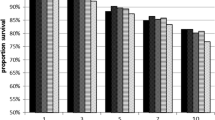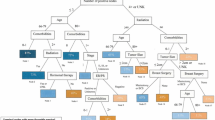Abstract
Background: Many believe that breast cancer should be treated by specialists. We studied the effect of surgeon and hospital specialization on survival after breast cancer treatment in a large, well-defined patient population.
Methods: The Cancer Surveillance Program database for Los Angeles County was reviewed. Between 1990 and 1998, 43,411 cases of breast cancer were diagnosed, of which 29,666 had complete data on surgeon, hospital, and staging information. Patients were stratified on the basis of surgeon and hospital specialization, as well as by age, race, stage, surgical procedure, and surgeon and hospital case volume. An analysis of survival and its dependence on these factors was performed.
Results: Age, race, socioeconomic status, tumor size, nodal status, extent of disease, surgeon specialization, surgeon case volume, and hospital case volume were all associated with 5-year survival after diagnosis of breast cancer. Treatment at a specialty center did not affect survival. Multivariate analysis indicated that type of surgeon was an independent predictor of survival (relative risk, .77), as were both hospital and surgeon case volume.
Conclusions: Treatment by a surgical oncologist resulted in a 33% reduction in the risk of death at 5 years. The effect of surgical specialization cannot be entirely attributed to volume effects.
Similar content being viewed by others
REFERENCES
Choti MA, Bowman HM, Pitt HA, et al. Should hepatic resections be performed at high-volume referral centers? J Gastrointest Surg 1998; 2:11–20.
Begg CB, Cramer LD, Hoskins WJ, Brennan MF. Impact of hospital volume on operative mortality for major cancer surgery. JAMA 1998; 280:1747–51.
Glasgow RE, Showstack JA, Katz PP, Corvera CU, Warren RS, Mulvihill SJ. The relationship between hospital volume and outcomes of hepatic resection for hepatocellular carcinoma. Arch Surg 1999; 134:30–5.
Birkmeyer J, Siewers AE, Finlayson EV, et al. Hospital volume and surgical mortality in the United States. N Engl J Med 2002; 346:1128–37.
Rosemurgy A, Bloomston M, Serafini FM, Coon B, Murr MM, Carey LC. Frequency with which surgeons undertake pancreaticoduodenectomy determines length of stay, hospital charges, and in-hospital mortality. J Gastrointest Surg 2001; 5:21–6.
Simunovic M, To T, Theriault M, Langer B. Relation between hospital surgical volume and outcome for pancreatic resection for neoplasm in a publicly funded health care system. CMAJ 1999; 160:643–8.
Sosa J, Bowman HM, Gordon TA, et al. Importance of hospital volume in the overall management of pancreatic cancer. Ann Surg 1998; 228:429–38.
Glasgow R, Mulvihill S. Hospital volume influences outcome in patients undergoing pancreatic resection for cancer. West J Med 1996; 165:294–300.
Lieberman M, Kilburn H, Lindsey M, Brennan MF. Relation of perioperative deaths to hospital volume among patients undergoing pancreatic resection for malignancy. Ann Surg 1995; 222:638–45.
Dudley R, Johansen KL, Brand R, Rennie DJ, Milstein A. Selective referral to high-volume hospitals: estimating potentially avoidable deaths. JAMA 2000; 283:1159–66.
Saettler E, Temple W. The surgeon as a prognostic factor in the management of pancreatic cancer. Surg Oncol Clin North Am 2000; 9:133–42.
Bach P, Cramer LD, Schrag D, Downey RJ, Gelfand SE, Begg CB. The influence of hospital volume on survival after resection for lung cancer. N Engl J Med 2001; 345:181–8.
Hillner B. Is cancer care best at high-volume providers? Curr Oncol Rep 2001; 3:404–9.
Schrag D, Cramer LD, Bach PB, Cohen AM, Warren JL, Begg CB. Influence of hospital procedure volume on outcomes following surgery for colon cancer. JAMA 2000; 284:3028–35.
Simons A, Ker R, Groshen S, et al. Variations in treatment of rectal cancer: the influence of hospital type and caseload. Dis Colon Rectum 1997; 40:641–6.
Marusch F, Koch A, Schmidt U, Pross M, Gastinger I, Lippert H. Hospital caseload and the results achieved in patients with rectal cancer. Br J Surg 2001; 88:1397–402.
Ellison L, Heaney J, Birkmeyer J. The effect of hospital volume on mortality and resource use after radical prostatectomy. J Urol 2000; 163:867–9.
Yao S-L, Lu-Yoa G. Population-based study of relationships between hospital volume of prostatectomies, patient outcomes, and length of hospital stay. J Natl Cancer Inst 1999; 91:1950–6.
Lerut T. The surgeon as a prognostic factor. Ann Surg 2000; 232:729–32.
Roohan P, Bickell NA, Baptiste MS, Therriault GD, Ferrara EP, Siu AL. Hospital volume differences and five-year survival from breast cancer. Am J Public Health 1998; 88:454–7.
SSO Mission Statement. 2002. Society of Surgical Oncology Web site. Available at: http://www.surgonc.org/sso/missframe.htm. Accessed May 13, 2003.
Kalbfleisch J, Prentice R. The Statistical Analysis of Failure Time Data. New York: Wiley, 1980.
Dixon WJ, Massey FJ. Introduction to Statistical Analysis. 3rd ed. New York: McGraw-Hill, 1969.
Bickell N, Chassin M. Determining the quality of breast cancer care. Do tumor registries measure up? Ann Intern Med 2000; 132:705–10.
Birkmeyer J, Warshaw AL, Finlayson SR, Grove MR, Tosteson AN. Relationship between hospital volume and late survival after pancreaticoduodenectomy. Surgery 1999; 126:178–83.
Morrow M, Stewart A, Sylvestar J, Bland K. Hospital volume predicts outcomes in breast cancer: a National Cancer Data Base (NCDB) study (abstract). Proc Am Soc Clin Oncol 2000; 19:309.
Latosinsky S, Bear H. Do surgical oncologists achieve lower rates of loco-regional recurrence in node positive breast cancer treated with mastectomy alone? J Surg Oncol 2001; 78:2–7.
Giacomantonio C, Temple W. Quality of cancer surgery. Challenges and controversies. Surg Oncol Clin North Am 2000; 9:51–60.
Gillis C, Hole D. Survival outcome of care by specialist surgeons in breast cancer. A study of 3786 patients in the west of Scotland. BMJ 1996; 312:145–8.
Author information
Authors and Affiliations
Corresponding author
Rights and permissions
About this article
Cite this article
Skinner, K.A., Helsper, J.T., Deapen, D. et al. Breast Cancer: Do Specialists Make a Difference?. Ann Surg Oncol 10, 606–615 (2003). https://doi.org/10.1245/ASO.2003.06.017
Received:
Accepted:
Issue Date:
DOI: https://doi.org/10.1245/ASO.2003.06.017




